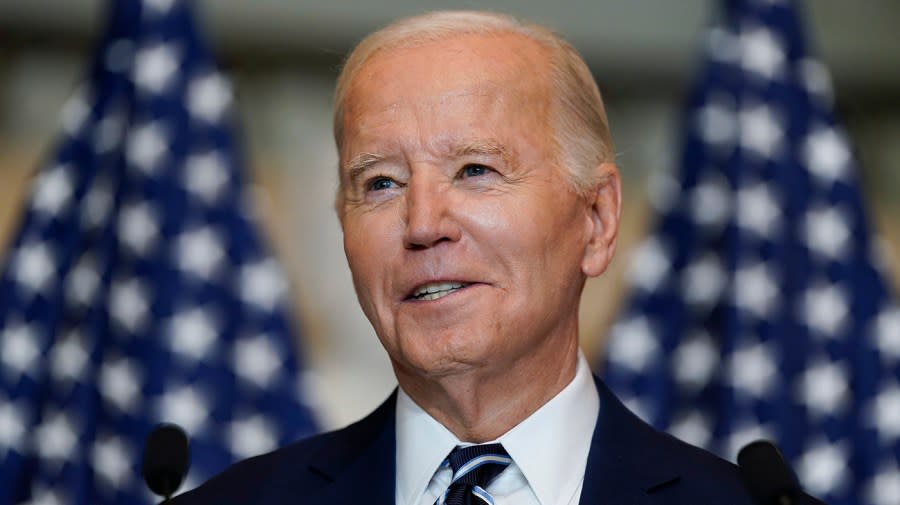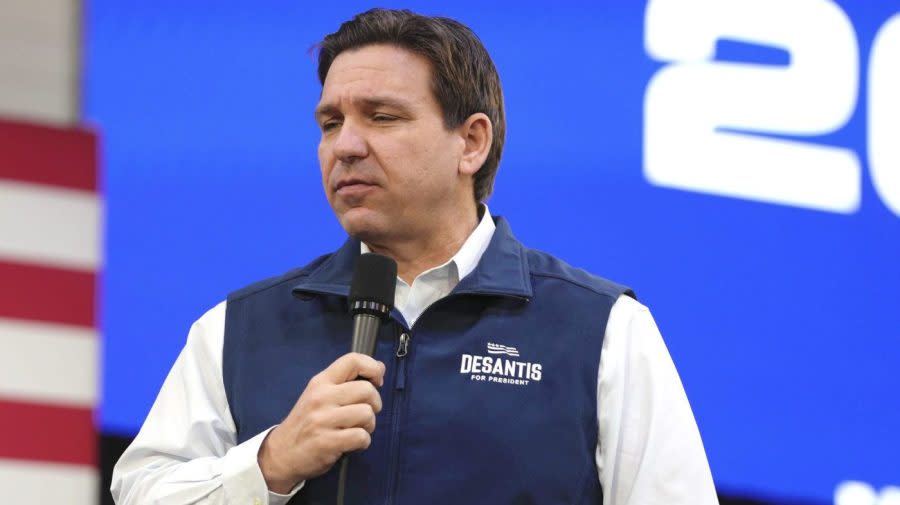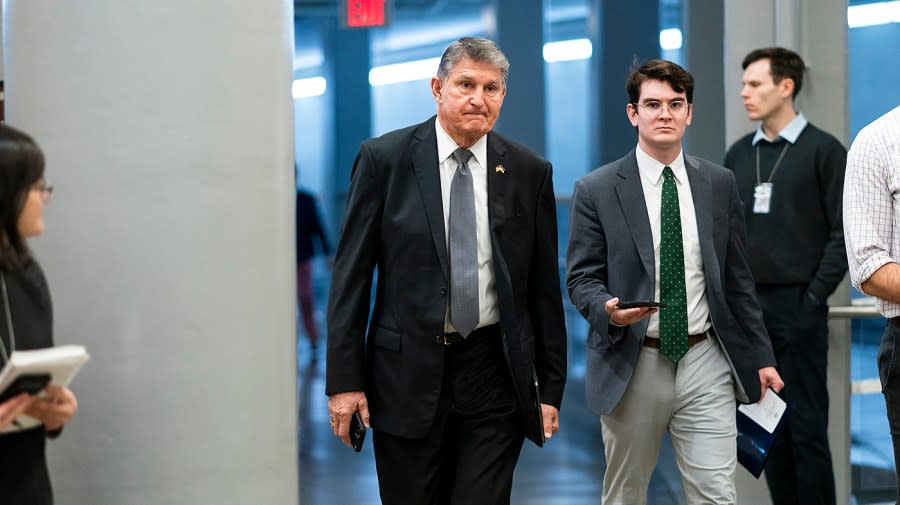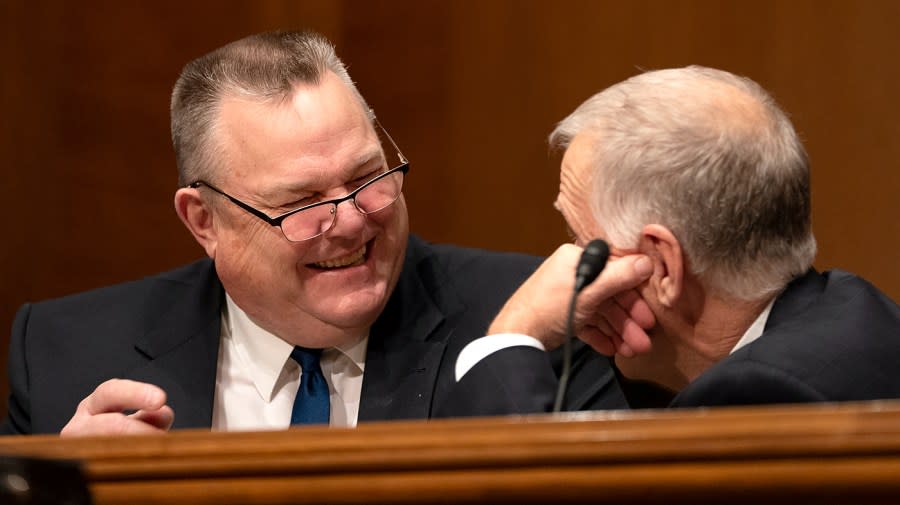What we learned from 2024 candidates’ year-end fundraising reports
- Oops!Something went wrong.Please try again later.
- Oops!Something went wrong.Please try again later.
- Oops!Something went wrong.Please try again later.
Candidates for federal office have submitted their campaign finance reports to the Federal Election Commission (FEC), giving a clearer picture of their prospects for 2024.
The FEC’s filing deadline for year-end reports for 2023, which fell on Wednesday, required all candidates for federal office — including for president, the Senate and the House — to disclose their fundraising totals.
The new data comes as the presidential primaries are already well underway, and some Senate primaries will start being held in the next couple of months.
Here are six things we learned from candidates’ most recent filings:
Biden outpaces Trump in fourth-quarter fundraising

President Joe Biden speaks at the National Prayer Breakfast at the Capitol in Washington, Thursday, Feb. 1, 2024. (AP Photo/Andrew Harnik)
President Biden continued to lead former President Trump in the fundraising game during the last quarter of 2023, with his principal campaign committee bringing in about $33 million. Trump, meanwhile, raised about $19 million.
That’s a significantly larger margin than the third quarter, when Biden edged out Trump with $24.8 million to the former president’s $24.5 million.
The added contributions give both front-runners tens of millions of dollars in cash on hand, but Biden has a clear advantage, with $46 million in the bank to Trump’s $33 million.
Biden saw a jump in the amount that his joint fundraising committees and the Democratic National Committee received, raising $97 million, up from $72 million and $71 million, respectively, from the second and third quarters.
Biden also significantly outraised his long-shot opponents for the Democratic nomination as the official Democratic primary season is about to start with the South Carolina primary on Saturday.
Rep. Dean Phillips (D-Minn.), who launched a primary challenge arguing that Biden’s age and approval rating show that he could not defeat Trump in a general election, raised a decent $5 million as a long-shot candidate. But he also burned through more than $4.5 million, leaving him with just about $360,000 in cash on hand going into this year.
Author Marianne Williamson raised just $1.3 million and has only $200,000 on hand.
Trump spending massive amount on legal fees

FILE – Former U.S. President Donald Trump attends the closing arguments in the Trump Organization civil fraud trial in the Manhattan borough of New York, Jan. 11, 2024. Trump could testify as soon as Monday, Jan. 22, in his defamation trial for calling sexual assault accuser E. Jean Carroll a liar. But the judge has ruled that if Trump takes the stand, he won’t be allowed to say that the writer concocted her allegation, nor that she was motivated by financial or political considerations. (Shannon Stapleton/Pool Photo via AP, File)
Beyond the obstacles posed by Trump’s legal difficulties themselves, the former president is facing the reality of his expenses eating into how much he is raising.
His fundraising committees overall spent nearly $30 million during the second half of 2023 on legal fees, adding on to $21 million already spent during the first half. Politico reported that Trump’s committees spent more during 2023 than they took in by about $10 million.
Nikki Haley, Trump’s last remaining Republican rival, raised $24 million across her political operation in the last three months of the year, leaving her with $14.5 million cash on hand. Trump has much more in the bank with his $33 million heading into the year.
The former president has easily outraised his GOP rivals, but he is going to be facing hurdles as the general election season approaches. Trump’s legal issues will continue to develop throughout the year, requiring his fundraising committees to divert significant resources for related expenses.
Former Trump rivals struggled down the stretch

Republican presidential candidate Florida Gov. Ron DeSantis speaks at The Hangout on Saturday, Jan. 20, 2024, in Myrtle Beach, S.C. (AP Photo/Meg Kinnard)
A Republican race that at its height featured a dozen candidates is now down to two, as Trump has dominated the contest. He has also dominated in accruing donations, leaving his opponents strapped for cash.
Presidential candidates who suspended their campaigns were still required to submit a filing to the FEC for the last quarter, and the filings reveal the financial struggles they faced ahead of dropping out.
Florida Gov. Ron DeSantis (R), who at one time was viewed as a candidate who could seriously face off with Trump, raised less than $7 million for his campaign. He dropped out just after the Iowa caucuses last month.
The super PAC supporting his campaign, Never Back Down, raised $14.5 million in the second half of the year. The one supporting Trump’s campaign, MAGA Inc., raised $46 million in that time.
Vivek Ramaswamy raised about $14.7 million during the last quarter, but he spent almost all of it as he failed to make significant inroads, only having about $1.5 million left at the end of the year. He also loaned his campaign more than $23 million throughout 2023, more than $10 million more than the total he received from others.
Sen. Tim Scott (R-S.C.) entered the race with millions of dollars in the bank from his Senate account, giving him an advantage over many rivals. But his donations slowed down considerably while his spending picked up ahead of him leaving the race in November.
Manchin refunded most donations from fourth quarter

Sen. Joe Manchin (D-W.Va.) arrives to the Capitol for procedural votes regarding nominations on Thursday, February 1, 2024. (Greg Nash)
Sen. Joe Manchin (D-W.Va.) sparked excitement when he announced in November that he would not seek reelection to his seat in the Senate, likely giving Republicans a pickup as they try to take the majority in the Senate in November.
But Manchin has continued to flirt with a presidential run, attending events for the political organization No Labels and refusing to rule out an independent bid.
At the same time, a lot more money came out of Manchin’s campaign account than went in through refunds made to contributors.
Top Stories from The Hill
Trump doles out millions to lawyers: Here’s who’s getting the most
GOP moderates adopt hard-line tactics amid Republican infighting
The campaign refunded more than $2.8 million in contributions during the quarter while raising $300,000. It only made $180,000 in operating expenditures.
Because of strong fundraising cycles in the past, Manchin still finished the year with $8.6 million, a decent amount to start with if he were to ultimately decide to run for president as an independent or with a third party.
But his numbers from this quarter do not obviously reflect someone about to launch a presidential run.
Kari Lake trails rival in Arizona

Arizona Senate candidate Kari Lake speaks during a television interview before Republican presidential candidate former President Donald Trump speaks during a campaign event in Laconia, N.H., Jan. 22, 2024.
One of the most hotly contested Senate races this fall will be in Arizona, a seat currently represented by Sen. Kyrsten Sinema, an independent who has not announced whether she will run for reelection.
Former GOP gubernatorial candidate Kari Lake seems likely to be the Republican nominee, while Rep. Ruben Gallego (D-Ariz.) has consolidated Democratic support behind him. Polls have shown a competitive race in a match-up between Lake and Gallego, but Lake raised only about 60 percent of Gallego’s total.
Lake’s campaign received about $2.1 million in the last quarter, while Gallego received more than $3.3 million. The five-term congressman’s advantage is more apparent in cash on hand, with his $6.5 million to Lake’s $1.1 million.
Lake’s fundraising will likely pick up, but Gallego’s head start could be critical in an expensive race.
Meanwhile, Sinema took in just $600,000 while spending about $800,000. She still has more than $10 million in the bank. Like Manchin, she has a decent amount of money if she decides to run, but her last quarter would not help much in that potential campaign.
Democratic Senate candidates racking up funds in war chest

Sen. Jon Tester (D-Mont.) speaks with Sen. Thom Tillis (R-N.C.) at a Senate Banking, Senate Banking, Housing, and Urban Affairs Committee hearing concerning stopping the flow of fentanyl at the Capitol on Thursday, January 11, 2024.
Democrats are largely on defense this year in the Senate with the GOP having many more pickup opportunities. But one way this has benefitted Democrats is that the party’s incumbents can focus on fundraising for the general election while Republicans fight it out in primary battles.
Sen. Jon Tester (D-Mont.), one of Republicans’ top targets, continued his strength in fundraising with an additional $5.5 million, bringing his cash on hand to about $11.2 million. The main Republican in the race currently, Tim Sheehy, only raised $2.3 million and has $1.3 million cash on hand.
Sen. Sherrod Brown (D-Ohio), also running for reelection in a state that voted for Trump twice, raised $6.6 million this past quarter, bringing his total in the bank to $14.6 million. Three Republicans are battling for the GOP nomination, but Brown outraised all of them.
Sen. Jacky Rosen (D-Nev.) leads her likely Republican opponent Sam Brown in cash on hand by about $9 million.
One exception to Democrats’ advantages was in Pennsylvania, where Republican Dave McCormick raised more than $5.4 million to Sen. Bob Casey’s (D-Pa.) $3.6 million.
All these contests will likely see millions of dollars poured in coming from inside and outside the state as the parties face off for the Senate.
For the latest news, weather, sports, and streaming video, head to The Hill.

